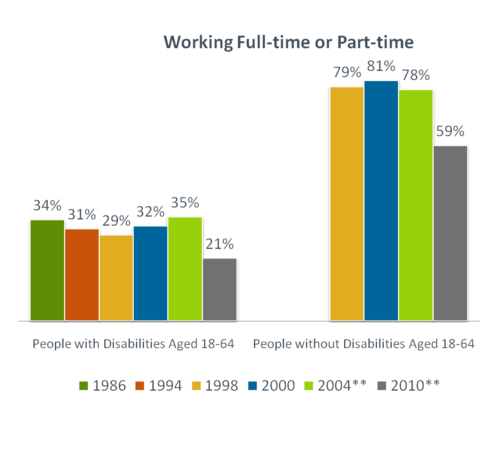How significant is unemployment and underemployment of persons with mental illness?
According to the National Alliance on Mental Illness (NAMI), the unemployment rate among adults with serious mental illness has been as high as 90%, the highest level of any group of people with disabilities.
According to a 2008 report, 16.5% of the population aged 21 to 64 had a disability and only 45.6% of this group was employed.
According to the chart below from a 2010 Harris Interactive survey, the employment gap between people with and without disabilities remains significant.

An article published in 2010, shows that during the period between October 2008 and June 2010, the proportion of employed U.S. workers identified as having disabilities declined by 9%, while there was no statistically significant change in the number of labor force participants without disabilities.
According to a 2006 article, one in three mental health consumers in the United States report being turned down for a job once their psychiatric status became known.
Is there bias against persons with mental illness?
According to that 2006 article:
- Surveys of U.S. employers show that half of them are reluctant to hire someone with past psychiatric history or currently undergoing treatment for depression.
- Approximately 70% are reluctant to hire someone currently taking antipsychotic medication.
- Half of U.S. employers would rarely employ someone with a psychiatric disability and almost a quarter would dismiss someone who had not disclosed a mental illness.
- People with mental disorders identify employment discrimination as one of their most frequent stigma experiences. Compared with individuals with physical disabilities, twice as many people with mental disabilities (the majority) expect to experience employment-related stigma.
How prevalent is mental illness?
According to a report by the National Institute of Mental Health, an estimated 26.2% of Americans ages 18 and older suffer from one or more brain or behavior disorders in a given year.
The Brain and Behavior Research Foundation reports that out of the 10 leading causes of disability identified and tracked in the United States; four are brain and behavior disorders: major depression, bipolar disorder, schizophrenia and obsessive-compulsive disorder.
More information on mental illness may be obtained from the National Alliance on Mental Illness, the National Institute of Mental Health, the Brain and Behavior Research Foundation, and the Depression and Bipolar Support Alliance.
What are the costs of unemployment and underemployment of the mentally ill?
Not only does the United States economy experience the indirect loss in productivity arising from the unemployment and underemployment of persons with mental illness, there is a direct, rising and material cost to the U.S. Treasury associated with Social Security Disability Insurance (SSDI) payments to those persons.
According to a 2011 paper, between 1989 and 2009, the share of adults receiving SSDI benefits doubled, from 2.3 to 4.6 percent of Americans ages 25-64. In the same interval, cash payments to SSDI recipients (adjusted for inflation) tripled to $121 billion.
One of the most common and rapidly expanding diagnoses for individuals receiving SSDI awards is mental illness, which comprised more than 20 percent of SSDI awards over the past decade. A 2005 study in the New England Journal of Medicine reports that the prevalence of mental disorders in the U.S. population was unchanged between 1990 and 2003 . In the same interval, the rate of treatment of mental illness substantially increased—which in turn should have contributed to improved work-readiness among individuals coping with mental illness.
Over the past twenty years there has been an exponential rise in the number of pre-employment assessments administered to applicants, driven in large part by the increase in the number of applications per job opening arising as a consequence of online postings of job opportunities. The pre-employment assessments, intentionally or not, discriminate against applicants with mental disabilities in the hiring process. As a result, too many people living with mental illness that are willing and able to work remain unemployed or underemployed.
No comments:
Post a Comment
Because I value your thoughtful opinions, I encourage you to add a comment to this discussion. Don't be offended if I edit your comments for clarity or to keep out questionable matters, however, and I may even delete off-topic comments.